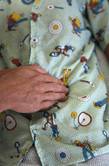
THURSDAY, Oct. 3 (HealthDay News) — Researchers report they have found a more palatable way to deliver a decidedly unappealing treatment that can cure a potentially deadly intestinal infection.
Until now, the transplantation of healthy fecal bacteria into a patient’s gut to tackle Clostridium difficile infections could only be done one of three ways: with an enema; a colonoscopy (placing a tube in the colon); or via a tube snaked through the nose and down the throat. But Canadian scientists have created capsules containing a concentrate of fecal bacteria that can simply be swallowed by the patient.
“It’s much more palatable for patients,” said Dr. Tom Moore, a clinical professor of medicine at the University of Kansas, who was not involved with the study. “It takes a lot of the ‘ick factor’ out.”
Even better, the capsules stopped recurring bouts of C. difficile, the Canadian researchers discovered. They plan to report their findings Thursday at IDWeek 2013, the infectious diseases society conference in San Francisco.
A reliable cure for C. difficile is much needed. The U.S. Centers for Disease Control and Prevention recently named the harmful bacteria one of the three most urgent health threats caused by the rise of antibiotic-resistant microbes.
C. difficile itself is not antibiotic-resistant, but it gains a foothold in the gut when healthy intestinal flora are decimated by strong antibiotics used to overcome the resistance of other bacteria.
Once active, C. difficile causes severe diarrhea in already weakened patients. About 250,000 people in the United States suffer from C. difficile infections every year and about 14,000 die, according to the CDC.
Doctors crafted the capsules by running healthy stool through a sieve, and then using a centrifuge to separate out the fecal bacteria and “discard everything but the bug,” said study author Dr. Thomas Louie, a professor of medicine at the University of Calgary, in Alberta.
The remaining fecal bacteria resembles off-white river clay, Louie said. It is scooped into a gelatin capsule, which is then placed inside two other layers of gelatin capsule to ensure that the bacteria will make it through the stomach to reach the lower intestine and the colon.
The researchers provided the pills to 27 patients with C. difficile and reported a 100 percent success rate. None of the patients had a recurrence of the infection, even though all of them previously had had repeat bouts with the germ. Patients ingested between 24 and 34 capsules containing fecal bacteria, often donated by family members.
Moore compared fighting C. difficile with fecal bacteria to restoring a lawn that has become infested with weeds.
C. difficile can be destroyed using antibiotics, much like using herbicides to get rid of the weeds, but that does nothing to restore the “lawn” within the gut to proper balance.
Alternatively, one can choose to reseed the lawn with fresh grass seed and hope the new grass crowds out the weeds. In the case of C. difficile, probiotics can sometimes boost healthy intestinal flora that crowd out the bad bug, Moore explained.
Fecal transplantation is more akin to planting fresh sod across the entire lawn, he suggested.
“This study confirms what has been suspected for quite some time, that fecal transplants are the most effective and most efficient way to restore gut health in patients with recurrent C. diff,” Moore said.
Further, he believes using capsules will make the process much easier for people.
Moore said he sees no reason why doctors can’t begin using handmade fecal bacteria capsules to treat C. difficile, particularly since the U.S. Food and Drug Administration has lifted a moratorium it had placed on the practice.
“I think the gelatin capsule idea could be enacted without regulatory difficulty,” Moore said. “The trick is to get the gelatin capsules and actually stuff them with the stool. Certainly, there’s no glamor in it.”
The data and conclusions of research presented at medical meetings should be viewed as preliminary until published in a peer-reviewed journal.
More information
For more information on C. difficile, visit the U.S. Centers for Disease Control and Prevention.
Copyright © 2026 HealthDay. All rights reserved.

